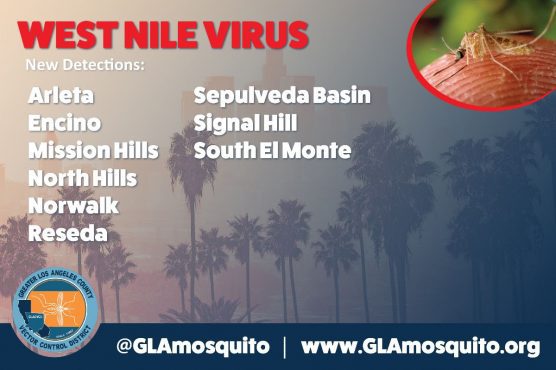The Greater Los Angeles County Vector Control District has confirmed 15 additional mosquito samples that tested positive for West Nile virus.
This brings the total number of positive samples within the District’s service area to 30 this year.
This is the first detection of the virus in nine different communities: Arleta, Encino, Mission Hills, North Hills, Norwalk, Reseda, Sepulveda Basin, Signal Hill, and South El Monte.
The 30 positive samples:
Arleta 7/15/2022 1
Bellflower 6/02/2022 2
Encino 7/14/2022 1
Granada Hills 6/28/2022 3
Hacienda Hts 6/30/2022 1
Lake Balboa 6/30/2022 1
Mission Hills 7/15/2022 1
North Hills 7/13/2022 1
Northridge 6/30/2022 3
Norwalk 7/12/2022 1
Panorama City 6/28/2022 3
Reseda 7/14/2022 2
San Marino 7/01/2022 3
Sepulveda Basin 7/13/2022 1
Signal Hill 7/14/2022 1
South El Monte 7/13/2022 1
Whittier 6/30/2022 4
West Nile virus is endemic to Los Angeles County, and warm temperatures can increase virus activity and mosquito populations. Visit VectorSurv Maps or WestNile.ca.gov for a comprehensive look at this year’s West Nile virus activity throughout Los Angeles County and Southern California.
West Nile virus is the most common mosquito-borne disease that affects residents in Los Angeles County. Public health agencies detect West Nile virus every year in L.A. County which means it’s endemic and found naturally in our city environments.
The agency reports data related to mosquitoes. Human cases are reported by the L.A. County Department of Public Health.
The disease surveillance program serves as an early warning system in the detection of mosquito-borne viruses that can infect people and animals.
The District uses the following factors to assess health risk in your community:
–Higher-than-average daily temperatures
–Mosquito Population Monitoring using traps set up in every community
–Mosquito Testing for Diseases
–Dead Birds state program: Dead birds help determine spread of West Nile virus
–Sentinel Chickens develop antibodies to West Nile virus, which can be detected by testing.
How You Can Help
Join Mosquito Watch to access online tools and resources such as the DIY Mosquito Source Checklist or request door hangers to be distributed in their community at www.MosquitoWatch.org.
Mosquito control is a shared responsibility and residents must take an active role in reducing the threat of mosquitoes and mosquito-transmitted diseases in their neighborhoods by taking the following steps:
Eliminate standing water in clogged rain gutters, rain barrels, discarded tires, buckets, watering troughs or anything that holds water for more than a week.
Ensure that swimming pools, spas, and ponds are properly maintained.
Change the water in pet dishes, birdbaths, and other small containers weekly.
Request mosquitofish from your local vector control district for placement in ornamental ponds.
Wear EPA-recommended insect repellent when outdoors where mosquitoes may be present.
Report neglected (green) swimming pools in your neighborhood to your vector control district.
Mosquito Prevention Tools
Did you know that Los Angeles County is serviced by five different vector control agencies? We’ve partnered to provide you a single location to find your vector control and share important tips on how to prevent mosquitoes and mosquito-transmitted diseases. Visit Vector Control to connect with your local agency.

Like this:
Like Loading...
Related





 Tweet This
Tweet This Facebook
Facebook Digg This
Digg This Bookmark
Bookmark Stumble
Stumble RSS
RSS




























REAL NAMES ONLY: All posters must use their real individual or business name. This applies equally to Twitter account holders who use a nickname.
0 Comments
You can be the first one to leave a comment.